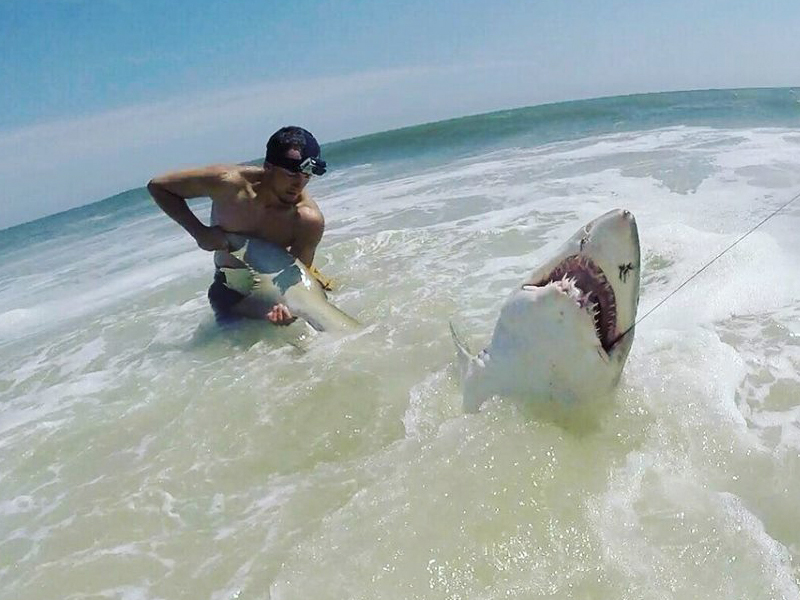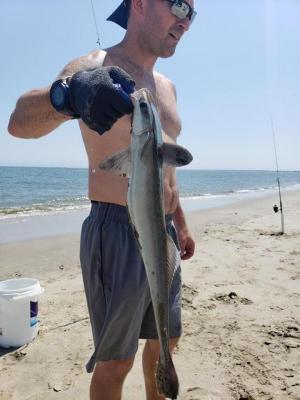The lowdown on shark-fishing rules

We are in full summer fishing mode. Little fish in the surf, big fish offshore, and the action has been typical for this time of year. Pond hopping is producing well and top water is starting to attract more hits in the evenings.
Put in the time and you will most likely catch something. Use mullet rigs for bluefish in the surf, top and bottom rigs with a variety of baits for the smaller fish. This time of year the fishing techniques do not change, just the frequency of catching. Early mornings and evenings are preferred for temperatures and light.
One thing people want to catch in the surf is sharks. Delaware has specific rules for shark fishing, and I wanted to share an interview I did few years ago with DNREC enforcement about those rules. The main thing to know is that the angler is responsible to know the rules about any species they are fishing for, not the fish.
Shark-fishing rules for the State of Delaware - from an interview in 2016:
I met Sgt. Troy Trimmer and Sgt. Greg Rhoades the other day for an interview about clarifying the rules for shark fishing and possession. There are a few in the guidebook, but again how the angler interprets these is up to them. The officers know this, and told me they can not put all of the rules in the guide book. The guidelines per Delaware state law are online at www.delaware.gov, and after reading them, I see they would definitely not fit in the book, and would take a few paragraphs to explain. Though the laws are more detailed on the State of Delaware site, there are a few that need to be clarified for the surf or shore angler. I asked the officers to help out so there is no more confusion. I would like to thank the officers for meeting me and taking a day away from their normal routine. These boys spend a lot of time on the go trying to enforce the state’s laws. They have a tough job, and I learned just how tough as the interview progressed. The word proactive came up a few times – let’s face it, they deal with people who have knives and/or guns all day – it was a good point.
The guidebook states that the shark is to be immediately released, so what is the definition of immediately released? “As soon as the shark is identified, it is to be immediately released if it is a prohibited species; if you do not know, then immediately let it go.”
What is meant by maximum probability of survival? “Sharks that are beached might have a 50/50 chance of surviving. This rule was put into use a few years ago when many sharks were washing up onto the beaches in Ocean City, Md. We found that the ones that were being caught in the surf in Delaware and beached were dying. The weight of the animal crushes its internal organs, and the shark may swim away only to die later from injuries sustained due to the beaching process, and then wash up on public beaches. Once the rule was in effect and enforced, the sharks stopped washing up on the beaches.”
I know that beaching a shark is prohibited by the rules concerning prohibited species, due to the fact that would be removing the animal from the water. Where do you consider the water to end, and the beach to begin? (Boaters are not to remove the shark from the water either.) “The whitewater in the surf is the closest to shore you can bring in the shark; the definition of land comes into play here.”
Where exactly is that? The wash, as I have always called it, is where the sand is exposed between waves; is that considered the whitewater? “No, the whitewater is just that – the whitewater where the waves flatten out behind the first wave. This way the shark is still in the water at all times. Remember as the animal must be identified first, it is not to be removed from the water in case it is a prohibited species.”
Is it illegal to fish for or target prohibited species? “No.”
I have heard of some people being fined for pictures with prohibited species out of water, is this a fineable offense? "Yes, it is considered possession of a prohibited species in Delaware.“
What are the fines involved if one does this? “The fines can be from $76.50 to $700 including court costs. The actual fine itself is $25.”
That seems rather cheap considering the fines for other offenses in Delaware. “Yes, that is something we would like to see raised so it is more of a deterrent.”
This information is what I really wanted to know, and I thanked the officers for taking the time to clarify some of these regulations. I tell people all the time that they are sending me pictures that are illegal. I hope this backs up those statements. I did ask the boys what information they would like to put out there for the angler, aside from this clarification of the rules that would help them (in enforcement) and Delaware anglers keep to the rules. Their main concern is conservation of resources.
The Delaware bay is a breeding ground for many of these sharks, particularity the sand tiger shark. One of the things they wondered is, is it really necessary to catch a shark? Since many are protected, this is their nursery, and their numbers are on the decline. They see plenty of people out there shark fishing that do it the right way, like getting waist- to chest-deep in the water to release the animal. Charter captains like Brian Wazlavek have a true respect for the animal and take great care in the release after catching a shark. I can attest to the fact that releasing the sharks while in the water is probably more thrilling than actually catching. Just get waist- to chest-deep one time with a 10-foot sand tiger shark, and you will know what I am talking about. The term pucker up comes to mind. Playing cowboy so you can brag to your friends, or take a picture with the mouth pulled back and a beer can on its head is not respectful of the shark caught. It is is also not true fishing, in my opinion.
The officers are not saying they want to see shark fishing shut down, but there is always that one person that messes it up for everyone else. For the most part, people have respect for the creatures they are catching.
There is just always that 2 to 5 percent that make it a problem for everyone. If the rules are not followed at any time, anything can be shut down, and this is true for any regulated industry. Recreational fishing is a very large part of this community, and we don’t need more legislation creating more rules. The majority of anglers are good people and follow the rules. A good way an angler can help with these sharks is to study the species and be able to identify them. If you don’t know, let it go. That is good advice, if you don’t know what you are fishing for, it would be a good idea to study up on what you are dealing with.
I receive many pictures each week of misidentified sharks. Bull sharks and sandbar sharks are confused the most. I hope this clarifies any confusion with the rules and regulations regarding shark fishing from the surf in the future.
The thing that was mentioned is the fact many people are not wearing their personal flotation devices when they are kayaking out bait. Please be sure to wear your PFD! When I asked what they thought of using a boogie board to take out baits, the response was a roll of the eyes and some laughter. “Well, that is one way to go if you want to get bit.”
Apparently that is not a good idea either. Remember, when it comes to our toothy friends, if you do not know, let it go. If you want a picture of you with a shark while releasing it in the surf, have a friend take the picture, and do not pose for it.























































